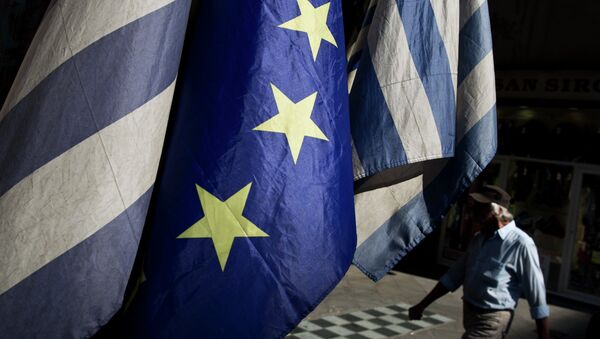WASHINGTON (Sputnik) — Also on Tuesday, the eurozone nations, meeting in Brussels, presented Greece with a two-day deadline to agree upon a new financial package with its creditors.
A full EU summit of leaders from all 28 member nations is scheduled to be held on Sunday.
“It’s a tremendous question: What you are seeing is efforts by the United States and by President [Barack] Obama to suggest to try and keep the Greeks in the European Union,” political and economic analyst John Nichols, a columnist for The Nation magazine, told Sputnik on Tuesday.
On July 5, 2015, Greek voters rejected in a referendum by 61-35 percent the creditors’ austerity terms in order to be provided additional funds to avoid defaulting on its obligations.
“The progress of this crisis and the strong ‘No’ vote also tells us that you can’t just beat a country with austerity continually with no let up.”
Greek Prime Minister Alexis Tsipras wants a negotiated settlement and is not trying to destroy Greece’s relations with the EU, or to deliberately wreck the Union, Nichols insisted.
“The Greeks have sent good signals. They have some allies. They want to stay in Europe. [But] that remains a challenge. There’s a long way to go before we see a resolution of all this.”
The analyst suggested the United States and France were trying to resolve the crisis.
“Other players are coming into the mix. The hardliners [Germany and the European Central Bank] are being encouraged to soften up.”
The Greek government was already quietly talking to President Francois Hollande in France, Nichols said.
“Even the International Monetary Fund (IMF) has sent some signals they would like to see some signs of accommodation.”
However, the Sunday vote meant Tsipras would not be forced to buckle down under EU, IMF and other international pressure, the expert said.
“Because the vote was such a landslide, the Greek government comes to the table with a stronger hand. The Greek government is representing popular sentiment.”
The Greek example might prove popular in other European countries that had also suffered for years under tough austerity programs, Nichols predicted.
“If there really is overwhelming opposition to austerity, especially across a continent, it cannot be ignored,” he said. “People do have to recognize social democracy. “
Ivan Eland of the Independent Institute agreed that EU leaders would probably try and prevent a full Greek exit from the Union.
“What will the Europeans do? And what should they do? They will probably knuckle under and reach a settlement with Greece that kicks the can of reckoning down the road yet again.”
Eland said he believed EU leaders feared a Greek exit from the eurozone could set off a chain reaction in other Mediterranean economies.
“They believe a Greek exit might crash the entire euro project if the financial contagion spreads to countries such as Spain and Portugal.”
However, Eland said expelling Greece from eth eurozone could have a number of benefits. It would remove the burden of carrying Greece’s substantial debts from EU financial institutions and taxpayers, and would inspire financial discipline in other European economies.

